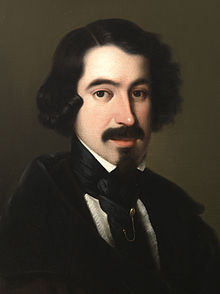José de Espronceda
José de Espronceda | |
|---|---|
 El escritor José de Espronceda, portrait by Antonio María Esquivel (c.1845) (Museo del Prado, Madrid)[1] | |
| Born | José Ignacio Javier Oriol Encarnación de Espronceda y Delgado 25 March 1808 Almendralejo, Province of Badajoz, Extremadura, Spain |
| Died | 23 May 1842 (aged 34) Madrid, Spain |
| Resting place | Cementerio de San Justo |
| Nationality | Spanish |
| Occupation(s) | Poet, writer and journalist |
| Movement | Romanticism |
| Children | Blanca Espronceda de Escosura (1834–1900) |
| Parent |
|
José Ignacio Javier Oriol Encarnación de Espronceda y Delgado (25 March 1808 – 23 May 1842)Diego de Alvear.[4]
Life

Espronceda was born in
Ferdinand VII and intending to avenge the death of Rafael del Riego. For this, he was imprisoned in a monastery and exiled.[6] Afterward, he left Spain and lived in Lisbon, Belgium, France, England and Holland. On his return to Spain in 1833, he became active in the extreme left-wing of Spanish political culture. Espronceda is also known for his affair with Teresa Mancha, for whom he wrote "Canto a Teresa" (from El diablo mundo). He died of diphtheria
in 1842.
In 1902, his body was moved to
Panteón de Hombres Ilustres, Spain.[7]
Literary production
Having been inspired to a literary career by his teacher
lyric poems, the latter remained unfinished. Also important were A Jarifa en una orgía, El verdugo,[3] El canto del cosaco, La canción del pirata[3] and Himno al sol. Many of his works display the tendencies of Romanticism, and along with José Zorrilla he is considered Spain's most important Romantic poet, as well as the most rebellious.[citation needed
]
In 2006 Diego Martinez Torron has published the first annotated edition of the complete works of José de Espronceda with unpublished text, and with also unpublished text in El otro Espronceda.[8][9]
References
- ^ "El escritor José de Espronceda". Museo del Prado (in Spanish). Madrid. Retrieved 27 March 2013.
- ^ Navas-Ruiz, Ricardo. "José de Espronceda y Delgado". Diccionario biográfico España (in Spanish). Real Academia de la Historia.
- ^ Cervantes Virtual(in Spanish). Retrieved 16 December 2017.
- Cervantes Virtual(in Spanish). Retrieved 16 December 2017.
- ^ Cortón, Antonio (1906). Espronceda (PDF). Madrid: Casa Editorial Velásquez. p. 8.
- ISBN 9780618272600.
- ^ Espín Templado, María del Pilar. Biografía de Jose de Espronceda.
- ^ José de Espronceda, Obras completas, edicion de Diego Martinez Torron, Madrid, Cátedra, 2006 (Bibliotheca Áurea).
- ^ El otro Espronceda, edicion de Diego Martinez Torron, Sevilla, Alfar, 2016, (Alfar Universidad, 215)
Bibliography
- Marrast, Robert (1974). José de Espronceda et son temps. Littérature, societé, politique au temps du romantisme. Paris: Editions Klincksieck.
- "De Gibraltar a Lisboa, viaje histórico". El Pensamiento. LXXII (8). Biblioteca de Autores Españoles: 174–177. 31 August 1841.
- "Un recuerdo". El Pensamiento. LXXII (3). Biblioteca de Autores Españoles: 60–64. 15 June 1841.
- "Política general". El Pensamiento. LXXII (1). Biblioteca de Autores Españoles: 12–15. 15 May 1841.
- de la Escosura, Patricio (1879). Discurso...Madrid. p. 79.
- Casalduero, Joaquín (1967). Espronceda (2nd ed.). Madrid.
{{cite book}}: CS1 maint: location missing publisher (link) - Zorrilla, José (1882–1883). Recuerdos del tiempo viejo. Vol. I. Madrid. pp. 46–50.
{{cite book}}: CS1 maint: location missing publisher (link) - Geoffrey Brereton, Quelques précisions sur les sources d'Espronceda (Paris, 1933)
External links
Spanish Wikisource has original text related to this article:
- Works by José de Espronceda at Project Gutenberg
- Works by or about José de Espronceda at Internet Archive
- Works by José de Espronceda at LibriVox (public domain audiobooks)

